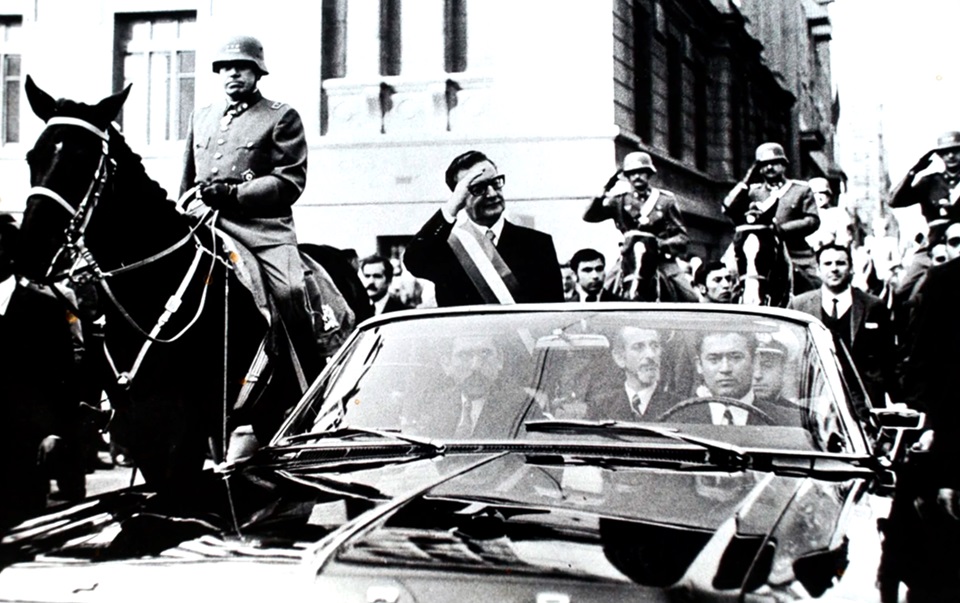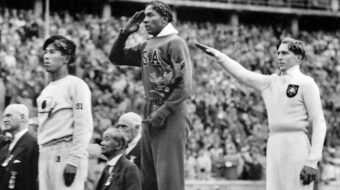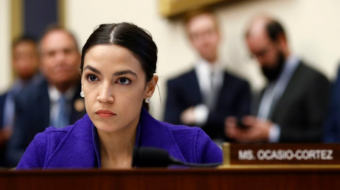
WASHINGTON—In the gush of words even in the mainstream media, on cable and elsewhere, the old operative Latin phrase, De mortuis nil nisi bonum dicendum est, do not speak ill of the dead, has had to be discarded. Even big sections of the ruling class have found it impossible not to condemn much of what Kissinger did during his life.
As a key member of the Richard Nixon administration, Kissinger was involved to a greater or lesser degree in its paranoia, “anti-communism,” secrecy, and its illegalities. And not just abroad.
Let’s start with the obvious, Kissinger’s forte, foreign policy. Like Nixon, Kissinger was obsessed with an alleged but non-existent Soviet threat to the U.S. He, like Nixon, saw anti-colonialist, anti-imperialist movements, which they considered nothing more than Marxist infiltration, seething south of the border.
Salvador Allende, the democratically elected socialist president of Chile was “Exhibit A.”
Fidel Castro’s socialist Cuba existed not too far off the coast of Florida and it had done so for more than a decade by the time Allende donned the presidential sash at Santiago’s La Moneda, in 1970.
The addition of Allende to the leadership of a Latin American nation completely freaked out Nixon, Kissinger, the CIA, and the small group of other top staffers who gathered to deal with the latest “menace.” They saw Reds spreading out everywhere. If not under your bed they were certainly all over the Western Hemisphere. And it was now the time to put a stop to the “menace.”
Authored a memo
Kissinger authored an extensive memo, which Nixon signed off on, detailing specific measures to politically destabilize, economically strangle, and ultimately topple Allende’s coalition government. The capstone to their plan was CIA aid to and coordination with anti-Allende elements of the Chilean military, culminating as we all know now, in the bloody coup which took a defiant Allende’s life in 1973.
Allende’s replacement was the decades-long repressive pro-“free market” dictatorship of General Augusto Pinochet, who had turned against the president who had appointed him military chief of staff.
But wait, we’re not done. Nor are Kissinger and Richard Nixon.
If a Marxist leader in Chile was a freak-out for the two, so was the 1971 release of the Pentagon Papers, the giant, exhaustive, and exceedingly critical history of the U.S.’s disastrous involvement in Indochina—again fighting that “Marxism” which was part of the national uprising of the Vietnamese people.
Nixon, paranoid about leaks, had his staff launch all sorts of nefarious and illegal schemes to stop suspects. The Huston Plan. The Plumbers. Planned Arson—which never came off—disinformation, misinformation, and more. The break-in at the office of Daniel Ellsberg’s psychiatrist.
“Rat-f–king” one participant called it. “Using available government mechanisms to screw our political enemies,” as then-White House Counsel John Dean put it.
All of which culminated in the June 1972 Watergate break-in, the capture of the burglars, and the following and eventually collapsing multiple cover-ups, trials over tapes, the “Saturday Night Massacre,” Nixon’s impeachment by the House Judiciary Committee, and his resignation in the face of certain Senate conviction, the pardon and the trials, convictions and jail terms for Nixon’s top team.
Except Kissinger. Why? Because he had a smaller—so to speak—Watergate role and was never a subject of investigation. But he was in it.
Kissinger had a dual attitude toward leaks. If a leak made him look good, including some he was suspected of leaking himself, he was pleased.
If it didn’t make him look good, ask Morton Halperin and Daniel Schorr what happened.
Kissinger, who also was National Security Advisor, suspected Halperin, then a National Security Council staffer, was leaking to Schorr, an outstanding investigative reporter for CBS News. So Kissinger bugged both men’s phones.
Just another facet of the paranoia, secrecy, and illegalities—yes, such unauthorized wiretapping was and is not kosher—surrounding Henry Kissinger and his boss, the man who later told interviewer David Frost, “If the president does it, it must be legal.”
We hope you appreciated this article. At People’s World, we believe news and information should be free and accessible to all, but we need your help. Our journalism is free of corporate influence and paywalls because we are totally reader-supported. Only you, our readers and supporters, make this possible. If you enjoy reading People’s World and the stories we bring you, please support our work by donating or becoming a monthly sustainer today. Thank you!












Comments